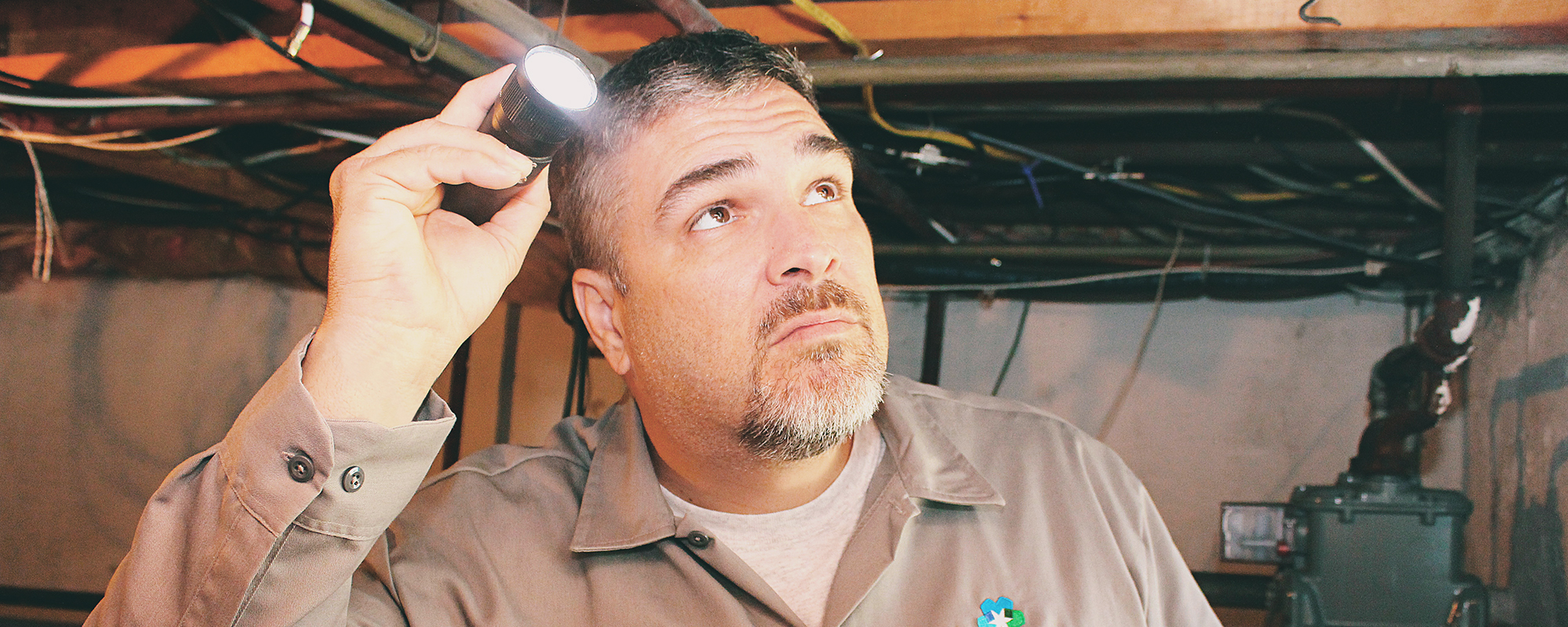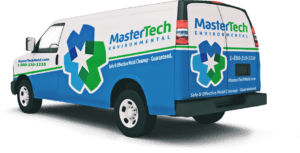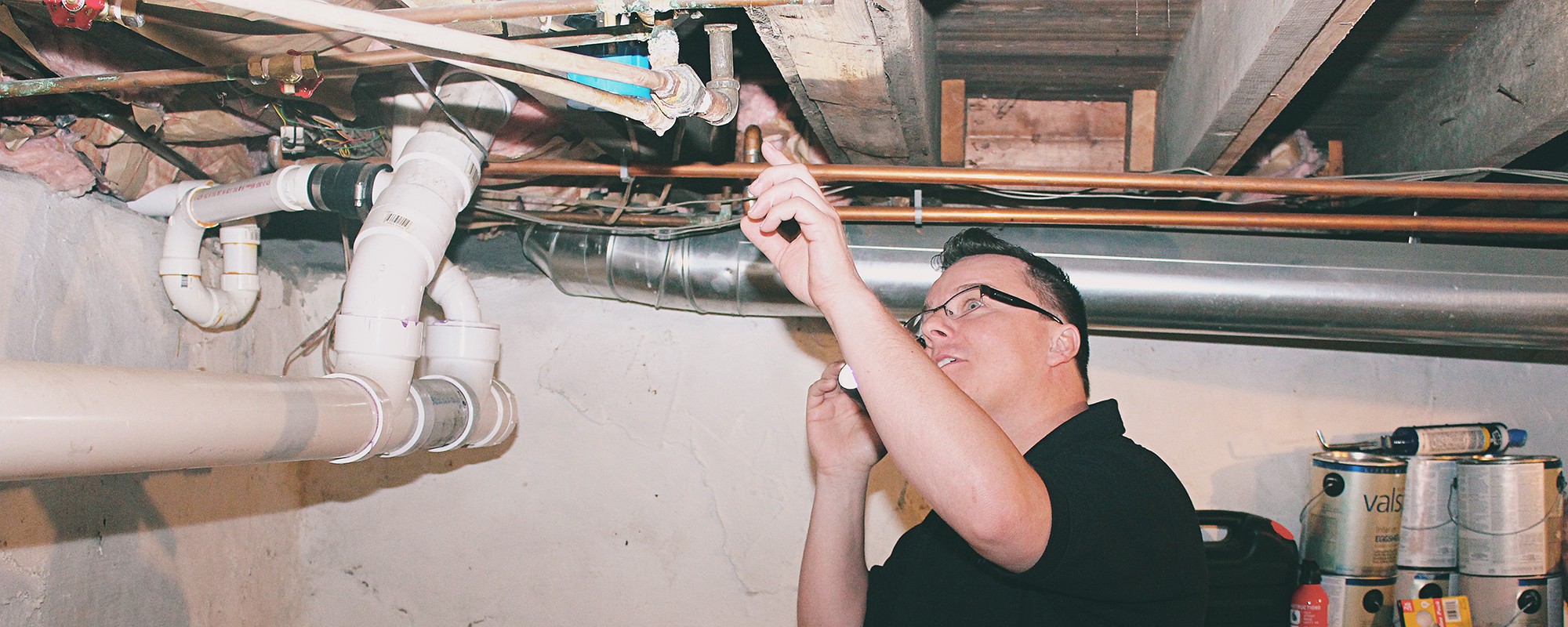
Indoor mold growth can be a serious problem that requires professional attention. Not only does mold spread quickly, potentially damaging the structure of your home, it can also cause serious health problems to you or your family members. If you know, or even suspect, you have mold, it’s crucial that you take care of it right away.
Musty odors, suspicious discoloration or signs of staining can all be indicators of mold and an underlying moisture problem. Or perhaps, your property has recently suffered from moisture problems (i.e: leaks, flooding, humidity, etc.), and you suspect that moisture left behind is contributing to mold development. The only way to know for certain is by contacting a certified mold inspector to have your home or business properly inspected for mold. When it comes to mold, timing is vital. With an adequate moisture source, it only takes 24-48 hours for mold to develop and spread. Early detection can save you and your family from a serious and costly mold remediation.
A certified mold inspector will be able to do the following: 
- Confirm if a mold problem exists
- Determine the severity of the mold problem
- Identify what caused the mold in the first place
- Prescribe a safe and effect mold removal plan
- Recommend preventative tactics to avoid recurrence
Ideal scenario, a mold inspector reports that you do not have a mold problem, and you and your family now have a peace of mind. Even if the inspection determines that a mold problem does not exist, it can reveal vulnerabilities that you can address to prevent potential moisture problems and mold development in the future.
Mold Inspection Expectations – What Should a Mold Inspection Include?
If this is the first time you have ever suspected mold development in your home or business, you are likely unfamiliar with the mold inspection process and what to expect from a reputable mold inspector. It is important to do your research, ask lots of questions and familiarize yourself with some standard mold inspection expectations. Lets take a closer look at some mold inspection expectations and what a mold inspection should include:
Visual Assessment
- A thorough visual inspection is the starting point for every professional residential or commercial mold assessment. Your mold inspector will be looking for conditions that could contribute to mold development.
Moisture Mapping
- Where there is mold, there must be an underlying moisture source that is causing it. Identifying the moisture source should be one your mold inspector’s key priorities. Moisture mapping means using tools to isolate all building materials that are damp or wet enough to support mold growth. Understanding moisture patterns helps to determine where the moisture starts and stops, and it also helps in identifying if any leaks are activity leaking at the time of inspection.
- Thermal Imaging Cameras: Thermal imaging cameras (or infrared cameras) allow mold inspectors to detect temperature differences in (and often behind) building materials. Damp or wet building materials are almost always cooler than dry materials. This information helps in understanding how many areas have been affected by moisture, and, in turn, supporting mold growth. It’s an invaluable tool in the detection of moisture sources that cause mold growth.
- Moisture Meters: Moisture meters are used to measure the moisture content of building materials. Moisture can buildup in porous building materials over time and can easily be overlooked. Even if the materials are dry to the touch, there could still be significant moisture locked within its pores that could support mold growth.
Air and/or Surface Testing
- With the information gathering during the visual assessment and the moisture mapping steps of a mold inspection, your mold inspector will be able to determine if testing will be necessary for additional lab analysis. Mold testing can determine mold levels present as well as mold species present.
- Air Sampling: Airborne mold spores are not visible to the naked eye. In cases where there is a concern for hidden mold growth, air samples can be collected for additional analysis. Air samples will provide information about indoor mold spore levels and will help the mold inspector determine if indoor spore counts in the air are with normal ranges or not.
- Surface Sampling: In some situations, it may be difficult to visually differentiate between mold and some other substance. Is it just water staining, or is it mold? Surface testing with mold swabs or bio tape lifts will answer those questions. In many cases, surface testing isn’t necessary if mold growth is visibly obvious.
- Inner Wall Void Sampling: When mold is suspected behind a wall or above a ceiling, those areas should be tested. Today’s mold testing technologies and techniques allow mold inspectors to take air and surface samples from wall or ceiling voids without causing unnecessary damage to the property.
Lab Report
- Any samples taken during the mold inspection should be analyzed by a certified lab. Depending on the lab’s turnaround time, you should expect to receive a lab report within 2-5 business days. Most likely, you will be unable to decipher the lab report on your own. Once the lab report has been released, your mold inspector should verbally decipher the lab report you, go over what all the numbers mean and thoroughly discuss the next steps.
Mold Inspection Report
- In addition to a full lab report, each mold inspection should include a detailed mold inspection report that carefully outlines what was completed on-site during the inspection and what the lab report means in terms of mold development. If professional mold remediation is recommended, your mold inspection should provide a recommended scope of work for remediation as well.
Scope of Work
- A scope of work for mold remediation should include detailed cleanup suggestions as well as preventative measures that are necessary to keep mold from returning.
Looking for Mold Inspection in New Jersey?
It is important to set some mold inspection expectations during your research. Mold inspection expectations help to ensure the mold inspector you hire and mean your specific mold inspection needs. Mastertech Environmental is fully trained and certified to provide thorough mold inspections in New Jersey with detailed reports and documentation. Our technicians are fully equipped with and trained to use the most advanced tools to ensure an accurate and thorough mold inspection. Each mold inspection includes a full visual assessment, moisture mapping with thermal imaging cameras and moisture meters, mold testing and a full detailed report of findings. If mold presence is confirmed, we will develop a scope of work that will be tailored to your specific mold removal needs. If you are looking to schedule a professional mold inspection in New Jersey, call Mastertech today. 609-948-8844



